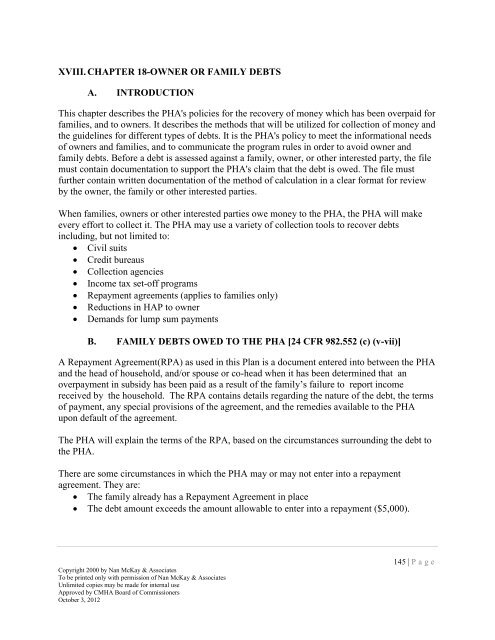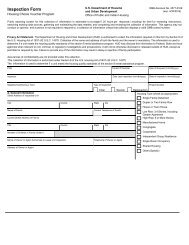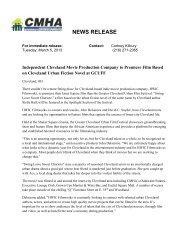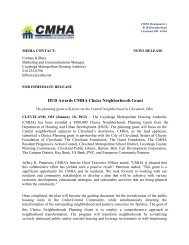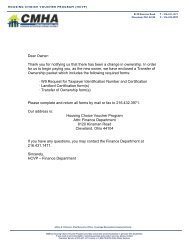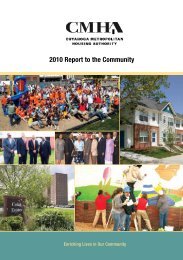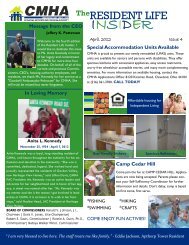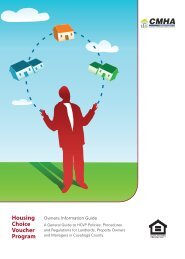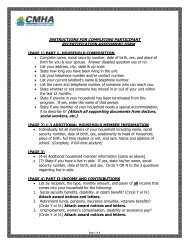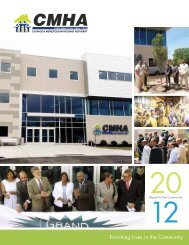2013 CMHA HCVP Admin Plan - Cuyahoga Metropolitan Housing ...
2013 CMHA HCVP Admin Plan - Cuyahoga Metropolitan Housing ...
2013 CMHA HCVP Admin Plan - Cuyahoga Metropolitan Housing ...
Create successful ePaper yourself
Turn your PDF publications into a flip-book with our unique Google optimized e-Paper software.
XVIII. CHAPTER 18-OWNER OR FAMILY DEBTS<br />
A. INTRODUCTION<br />
This chapter describes the PHA's policies for the recovery of money which has been overpaid for<br />
families, and to owners. It describes the methods that will be utilized for collection of money and<br />
the guidelines for different types of debts. It is the PHA's policy to meet the informational needs<br />
of owners and families, and to communicate the program rules in order to avoid owner and<br />
family debts. Before a debt is assessed against a family, owner, or other interested party, the file<br />
must contain documentation to support the PHA's claim that the debt is owed. The file must<br />
further contain written documentation of the method of calculation in a clear format for review<br />
by the owner, the family or other interested parties.<br />
When families, owners or other interested parties owe money to the PHA, the PHA will make<br />
every effort to collect it. The PHA may use a variety of collection tools to recover debts<br />
including, but not limited to:<br />
Civil suits<br />
Credit bureaus<br />
Collection agencies<br />
Income tax set-off programs<br />
Repayment agreements (applies to families only)<br />
Reductions in HAP to owner<br />
Demands for lump sum payments<br />
B. FAMILY DEBTS OWED TO THE PHA [24 CFR 982.552 (c) (v-vii)]<br />
A Repayment Agreement(RPA) as used in this <strong>Plan</strong> is a document entered into between the PHA<br />
and the head of household, and/or spouse or co-head when it has been determined that an<br />
overpayment in subsidy has been paid as a result of the family’s failure to report income<br />
received by the household. The RPA contains details regarding the nature of the debt, the terms<br />
of payment, any special provisions of the agreement, and the remedies available to the PHA<br />
upon default of the agreement.<br />
The PHA will explain the terms of the RPA, based on the circumstances surrounding the debt to<br />
the PHA.<br />
There are some circumstances in which the PHA may or may not enter into a repayment<br />
agreement. They are:<br />
The family already has a Repayment Agreement in place<br />
The debt amount exceeds the amount allowable to enter into a repayment ($5,000).<br />
Copyright 2000 by Nan McKay & Associates<br />
To be printed only with permission of Nan McKay & Associates<br />
Unlimited copies may be made for internal use<br />
Approved by <strong>CMHA</strong> Board of Commissioners<br />
October 3, 2012<br />
145 | P a g e


